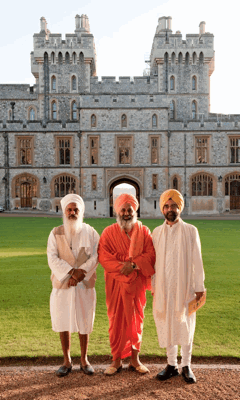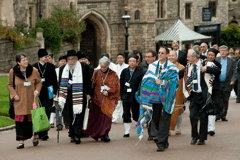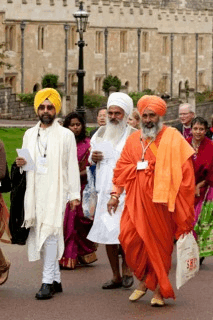God’s Green Earth
Air Date: Week of November 6, 2009

(ARC /Richard Stonehouse)
There may be a prayer for climate change prevention. Major world religious leaders and conservation organizations recently gathered in Windsor, England for the Many Heavens, One Earth conference to advance the fight against climate change. Host Jeff Young speaks with Martin Palmer, Secretary General of the Alliance of Religions and Conservation, about why these initiatives might have a greater impact on stewardship than scientific or political efforts.
Transcript
YOUNG: From the Jennifer and Ted Stanley Studios in Somerville, Massachusetts - this is Living on Earth. I’m Jeff Young. Next month, political leaders meet for an international summit in Copenhagen to try and meld science and policy on climate change. But a recent gathering of world dignitaries looked at global warming from another perspective – religion. Leaders of the world’s major faiths met at England’s Windsor castle for an event called “Many Heavens, One Earth”. They discussed climate action by churches, temples, mosques, and why protecting the planet is an article of faith.
[GOMAA: [ARABIC], TRANSLATOR: The Koran states “…do not cause corruption on the earth after it has been set in order…”; SAVAGE: In Jewish tradition, the big vision repeated thrice daily at the end of the traditional prayers is [HEBREW]. To heal and improve the world is the divine realm; THOMAS: Our Christian faith mandates that we honor the creation that God put under our charge; VYAS: Hindu scriptures are replete with spiritual and poetic references to Mother Earth, where the trees, the mountains, and the rocks become shrines.]
YOUNG: Martin Palmer is Secretary General at the Alliance of Religions and Conservation, which organized the event along with the UN Development Program. He joins us now from London. Mr. Palmer, welcome to Living on Earth.

(ARC /Richard Stonehouse)
PALMER: Thank you, Jeff.
YOUNG: Now, tell us about some of those religious leaders we just heard from there.
PALMER: The first one was the Grand Mufti of Egypt. He has enormous spiritual and intellectual authority within Islam, and he was speaking on behalf of the Muslim seven-year plan – setting out to green the Hajj, make sure the printing of Korans (15 million a year) is done on recycled paper, and so forth.
He was followed by Nigel Savage, who is representing the Jewish seven-year plan. Their commitment is to cut meat eating in the Jewish community by 50 percent by 2015 and to also link synagogues to local farms.
He was then followed by the dramatic Bishop Thomas, who comes from the New Psalmist Baptist Church in Baltimore, USA, and their commitment involves a whole youth training program in environmental action and a whole program of empowerment of the poor and the dispossessed, so that they can actually become a voice and a force, themselves, to tackle environmental problems.
And then, the final speaker was Kusum Vyas, who represents the Hindu nine-year plan. They are building on the old Hindu tradition of vegetarianism, which we now appreciate as of huge ecological significance, and the Hindus are planning to develop their own environmental label, so that Hindus can buy ethically, environmentally, and faithfully.
YOUNG: How many faith groups, in all, were represented?

(ARC /Richard Stonehouse)
PALMER: We actually had somewhere in the region of 50 major faith traditions from around the world – it was a huge gathering and it was a gathering not to discuss what they might do, it was a gathering at which they launched their long-term plans to help save and protect the living planet.
YOUNG: So, this was not just a talk – they’re going to practice what they preach, so to speak?
PALMER: Very good, you’ve put it that way. We as our maxim for the whole program a Confuciusist maxim, actually, that we developed with the UNDP, our UN colleagues that, first of all, practice what you want to preach, and then only preach what you’re already doing. And so nobody came to this event unless they had developed systematic long-term plans which would embed environmental awareness, education, action, use of their investment portfolios, turning their lands to organic, developing forestry schemes for their forests for the major faiths.
YOUNG: And do you know, roughly, how many people those groups at the gathering represent?
PALMER: Before the event, we had 31 major commitments from faiths around the world, and the UN calculated that these schemes could affect the lives of potentially two billion people. However, we had left it open for the possibility of new partnerships, new groups that wished to say, we haven’t got a scheme yet, but within the next year we will have one, and we had 19 new schemes that came forward – ranging from the Russian Orthodox church, remember they own something in the region of 30 million hectares of land in Russia, most of it forest and farm land – and some 18 commitments from major secular organizations, including the UN, the World Bank, WWF, and so forth.
YOUNG: So, two billion plus people potentially influenced by what these religious leaders say they’re going to carry out here. We’re getting up close to a third of humanity here.

(ARC /Richard Stonehouse)
PALMER: That’s right. Well, bear in mind that 85 percent of the world professes a faith. And one of the problems for the environmental movement has been that it emerged, initially, out of the secular northwest Europe and it saw the world through its own eyes and assumed that everybody else considered that religion was, if not irrelevant, about as significant as if you liked and Indian take-away or a Chinese take-away.
And, because the UN said, you know, there is no way we are going to tackle climate change or any of the other major environmental problems unless we are in partnership with the major moral, spiritual forces of the world, who also happen to own eight percent of the habitable surface of the planet, are the third largest investing group in the world, have either run, founded or set up some role in over 50 percent of all schools, and publish more books per year than the whole of the rest of the publishing industry.
The question really is why on earth weren’t they working with us before? And I think we’ve turned a corner. There is now a worldwide recognition that the faiths should be invited to the table as equals of any other sector of civil society. And a very strong sense, I have to say, that as we head towards Copenhagen, the nation states are rapidly losing the credibility that they can actually do anything, and it may be civil society and not least of all religion, which will actually have to try and negotiated our way out of this mess.
YOUNG: You know, along those lines, one statement at the event caught my ear. This is a piece of tape from the Reverend Sally Bingham:

(ARC /Richard Stonehouse)
BINGHAM: I believe that religious leaders talking about environmental stewardship from the pulpit will have far more influence than a scientist or a politician on their own.
YOUNG: Mr. Palmer, you obviously think she’s right there. Why is it, though, that a religious messenger might be a better one on this issue than a scientist?
PALMER: Because people trust them. It’s as simple as that. Scientists are, on the whole, not very good communicators. There are one or two exceptions.
They are not very good at telling stories, and one of the points that came out time and time again in our work in developing for this is that nobody was ever moved to change the way they live by a pie chart, but they are moved by a story.
And in a sense, the environmental world has relied on science and facts, bald facts if I can put it that way, for the last 40 years and the end result is we’re in a worse case than we were 40 years ago.
Nobody actually changes what they do unless they are inspired, touched, given hope. And to some degree, what has happened has been that the environmental movement has tried to mimic the power of religion, and it has stolen from religion certain aspects. So, it’s stolen the notion of sin: if you get up in the morning and you put on the radio, no doubt to listen to this program, you make a cup of tea – or rather being in America you make a cup of coffee because, sadly, you don’t know how to make tea – you then drive to work and you switch on your computer. You committed, according to environmentalists, four sins.
YOUNG: Hmmm, carbon sinners.
PALMER: Carbon sinners. They are very good at making us feel guilty they’re very good at fear. The trouble is they’re not very good at hope, salvation, liberation, redemption, and they’re appallingly bad at celebrating.
YOUNG: Well, I got to say when you talk about climate change it’s hard to see cause for celebration in this. I mean it’s a pretty gloomy outlook.

(ARC /Richard Stonehouse)
PALMER: Well, it is and it isn’t. You see, if there is nothing to celebrate, why would you bother? And the faiths are the oldest institutions in the world – they know more about how human psychology works than any other organization, which is why they’ve outlived every dynasty, every empire, they’ve outlived Communism pretty much, they’ve outlived the League of Nations, and as we gently point out to our colleagues in the UN, they will outlive the UN.
Now, how do they do this? They do this because they know that you can ask people to fast and you can ask them to repent, and then you feast. You have to fast and feast. If all you tell people they can do is fast, they give up. You’ve got to give people hope.
There’s a wonderful phrase in the psalms: without hope, people perish. And they perish because you cannot live with fear. Fear is disabling, it steals the energy from you. You’ve got to give people hope, not false hope, not say, oh don’t worry it’s all going to be fine it’s no problem at all.
But you got to say, look what is it that will make me as an Anglican do something with my church? What is that will make a Jew in New York take seriously what his or her Synagogue should do? What is that will make a Hindu in Fiji address the environmental issues in their own country?
And there is hope. There is still the possibility that we can turn the tide on climate change. We can’t stop some of it, but we can mitigate some of it. But there is also the belief that this world is not just material, which isn’t to say, don’t worry, you’ll be happy in heaven afterwards, but it is saying, you know, as Hamlet says to Horatio in the great play by Shakespeare: There are more things in heaven and earth than are thought of in your philosophy.
YOUNG: So, when environmentalists and scientists look at, say, these recent polling figures in the United States that show fewer people appear to be getting the message here, despite their efforts, you would say that’s because you guys don’t understand the power of the parable and the importance of inspiration?
PALMER: Precisely. We have been telling people that it’s hopeless for so long they’ve decided it’s not worth worrying about. Moreover, climate change is only a symptom; it’s not the problem. The problem, to use old-fashioned religious language, is sin, greed, and selfishness, and foolishness. That’s the problem, the fundamental problem is that we are out of kilter with our planet – we’re out of kilter with God, we’re out of kilter with our neighbors, and very often we’re out of kilter with ourselves.
And so, the solution is not to tackle climate change, per say, the solution is in fact to offer people a vision of living hopefully and living more simply, living more faithfully and doing so not as either victims or perpetrators, but perhaps, as heroes.
YOUNG: Martin Palmer is with the Alliance of Religions and Conservation. He’s telling us about the gathering of “Many Heavens, One Earth”. Thank you very much.
PALMER: Thank you.
Links
Living on Earth wants to hear from you!
Living on Earth
62 Calef Highway, Suite 212
Lee, NH 03861
Telephone: 617-287-4121
E-mail: comments@loe.org
Newsletter [Click here]
Donate to Living on Earth!
Living on Earth is an independent media program and relies entirely on contributions from listeners and institutions supporting public service. Please donate now to preserve an independent environmental voice.
NewsletterLiving on Earth offers a weekly delivery of the show's rundown to your mailbox. Sign up for our newsletter today!
 Sailors For The Sea: Be the change you want to sea.
Sailors For The Sea: Be the change you want to sea.
 The Grantham Foundation for the Protection of the Environment: Committed to protecting and improving the health of the global environment.
The Grantham Foundation for the Protection of the Environment: Committed to protecting and improving the health of the global environment.
 Contribute to Living on Earth and receive, as our gift to you, an archival print of one of Mark Seth Lender's extraordinary wildlife photographs. Follow the link to see Mark's current collection of photographs.
Contribute to Living on Earth and receive, as our gift to you, an archival print of one of Mark Seth Lender's extraordinary wildlife photographs. Follow the link to see Mark's current collection of photographs.
 Buy a signed copy of Mark Seth Lender's book Smeagull the Seagull & support Living on Earth
Buy a signed copy of Mark Seth Lender's book Smeagull the Seagull & support Living on Earth

